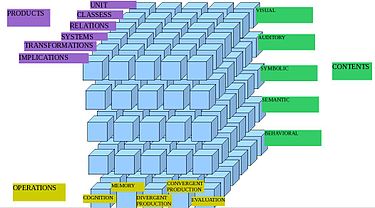Intellect

In the study of the human mind, intellect refers to and identifies the ability of the mind to reach correct conclusions about what is true and what is false, and about how to solve problems. The term intellect derives from the Ancient Greek philosophy term nous, which translates to the Latin intellectus (from intelligere, “to understand”) and into the French and English languages as intelligence. Discussion of the intellect is in two areas of knowledge, wherein the terms intellect and intelligence are related terms.[1]
- In philosophy, especially in classical and medieval philosophy the intellect (nous) is an important subject connected to the question: How do humans know things? Especially during late antiquity and the Middle Ages, the intellect was proposed as a concept that could reconcile philosophical and scientific understandings of Nature, with monotheistic religious understandings, by making the intellect a link between each human soul, and the divine intellect of the cosmos. During the Latin Middle Ages the distinction developed whereby the term intelligence referred to the incorporeal beings that governed the celestial sphere; see: passive intellect and active intellect.[2]
- In modern psychology and in neuroscience, the terms intelligence and intellect describe mental abilities that allow people to understand; the distinction is that intellect relates to facts, whereas intelligence relates to feelings.[3]
Intellect and intelligence[]
Intellect is the branch of intelligence that reflects the logical and the rational aspects of the human mind, which, lacking emotional engagement with a psychological problem, usually is considered as limited to facts and raw knowledge;[4] In addition to the functions of linear logic and patterns of formal logic the intellect also processes the non-linear functions of fuzzy logic and dialectical logic.[5]
Intellect and intelligence are contrasted by etymology; derived from the Latin present active participle intelligere, the term intelligence denotes “to gather in between”, whereas the term intellect derived from the past participle of intelligere denotes “what has been gathered”. Therefore, intelligence relates to the creation of new categories of understanding, based upon similarities and differences, while intellect relates to understanding existing categories.[6]
Development of intellect[]
Private experience is crucial to the development of intellect, because in resolving the problems of life a person can attain enlightenment, the full, intellectual comprehension of a situation, and so improve his and her behavior in order to act reasonably and appropriately in society. The development of the intellect occurs consequent to the person's emotional dissatisfaction that arises from the negative outcome of a given situation in life; mental development occurs from the search for solutions to the problems of life. Only experience can provide genuine and thoughtful understanding of reality, which consequently contributes to the person's intellectual development.[7]

Intellectual understanding is built upon creating a conceptual model of reality through perception and the reflective processes of cognition. The process of finding solutions to the problems of life enriches the human memory with the attributes of reality. The full potential of the intellect is achieved when a person acquires an accurate understanding of the real world, which is mirrored in the mind. The mature intellect is identified by the capability of emotional “self-management”, the psychological state wherein a person can encounter, face, and resolve problems as they arise in the course of life, thereby being capable of personal change, and also capable of altering his or her reality into a desirable life situation, thus success and failure depend upon the person possessing a mature intellect.[8]
Structure of intellect[]
In 1955, the psychologist Joy Paul Guilford (1897–1987) proposed a Structural Intellect (SI) model in three dimensions: (i) Operations, (ii) Contents, and (iii) Products. Each parameter contains specific, discrete elements that are individually measured as autonomous units of the human mind.[9] Intellectual operations are represented by cognition and memory, production (by divergent thinking and convergent thinking), and evaluation. Contents are figurative and symbolic, semantic and behavioral. Products are in units, classes, and relations, systems, transformations, and implications.[10]
Intellect in psychotherapy[]
Intellectualization is a psychotherapeutic method based upon intense intellectual focus in order to avoid a problem penetrating the person's mind. In psychological praxis, intellectualization is a defense mechanism that blocks feelings in order to prevent anxiety and stress from acting upon the person's psyche, which would interfere with his or her normal functioning in real life. As psychotherapy, intellectualization is a rational, dispassionate, and scientific attitude towards the mental problem causing psychological disturbance in the person.
The functions of intellectualization involve the Id, ego, and super-ego. The Ego is the conscious aspect of human personality; the Id is the unconscious, animal-instinct aspect; and the super-ego is the control mechanism that mediates and adjusts a person's thoughts and actions and behavior in accordance with the social norms of society. The purpose of intellectualization is to isolate the Id from the real world, and so make the conscious aspects of a person's life the only object of reflection and consideration. Therefore, intellectualization defends and protects the Ego from the Id, the unconscious aspect of human personality that usually is impossible to control.[11]
Socially, intellectualization uses technical jargon and complex scientific terminology instead of plain language; e.g. a physician uses the word carcinoma instead of cancer to lessen the negative impact of a diagnosis of terminal disease — by directing the patient's attention away from the bad news. The different registers of language, scientific (carcinoma) and plain language (cancer), facilitate the patient's acceptance of medical fact and medical treatment, by avoiding an outburst of negative emotions that would interfere with the successful treatment of the disease.[12]
Moreover, the defense mechanism of intellectualization is criticized because it separates and isolates the person from the painful emotions caused by the psychological problem. As such, the defense mechanism subsequently leads to the denial of intuition, which sometimes contributes to the processes of decision-making; a negative consequence of the absence of emotional stimuli can deprive the person of motivation, and lead to a mood of dissatisfaction, such as melancholy; such “emotional constipation” threatens his or her creativity, by replacing such capabilities with factual solutions.[13]
See also[]
References[]
- ^ Colman, Andrew M. (2008). A Dictionary of Psychology (3rd ed.). Oxford [etc.]: Oxford University Press. ISBN 9780191726828.
- ^ Davidson, Herbert (1992), Alfarabi, Avicenna, and Averroes, on Intellect, Oxford University Press page 6.
- ^ "Intellect and Intelligence". Psychology Today.
- ^ Sangha, Nithyananda. "Instinct, Intellect, Intelligence, Intuition". Nithyananda Sangha. Archived from the original on 23 July 2017. Retrieved 29 October 2015.
- ^ Rowan, John. (1989) The Intellect. SAGE Social Science Collections, p. 000.
- ^ Bohm, David and Peat, F. David. Science, Order, and Creativity (1987) p.114.
- ^ "Psychology of Knowledge: Development of the Intellect". augustinianparadigm.com. Retrieved 2015-11-01.
- ^ VandenBos, Gary R. (2006). APA Dictionary of Psychology (1st ed.). Washington, DC.: American Psychological Association. ISBN 978-1-59147-380-0.
- ^ "Structure of Intellect (J.P. Guilford)". www.instructionaldesign.org. Retrieved 2015-10-28.
- ^ "Guilford's 'structure of intellect' model". homepages.which.net. Retrieved 2015-11-02.
- ^ Lemouse, M. "Teaching Psychology — Defense Mechanisms". www.healthguidance.org. Retrieved 2015-10-25.
- ^ Khetarpal, A. "Intellectualization: Isolation from Emotions! (A Psychological Tranquilizer) | Mindful Cogitations". abhakhetarpal.in. Retrieved 2015-10-26.
- ^ "On Finding Out How We Don't Know Ourselves in Therapy and Counselling. (On Defences, Part Seven)". Lucid Psychotherapy & Counselling. 2015-05-19. Retrieved 2015-11-01.
External links[]
| Wikiquote has quotations related to: Intellect |
| Look up Intellect in Wiktionary, the free dictionary. |
- Aesthetics
- Ancient Greek philosophy
- Cognitive psychology
- Consciousness
- Critical thinking
- Empiricism
- Concepts in epistemology
- Epistemology of science
- Intellectualism
- Intelligence
- Mental content
- Mental processes
- Concepts in metaphilosophy
- Concepts in metaphysics
- Metaphysics of mind
- Observation
- Ontology
- Perception
- Philosophical logic
- Philosophical problems
- Philosophy of life
- Philosophy of logic
- Philosophy of psychology
- Principles
- Qualia
- Rational choice theory
- Rationalism
- Reasoning
- Skepticism
- Sources of knowledge
- Subjective experience
- Theories of truth
- Theory of mind
- Thought
- Truth